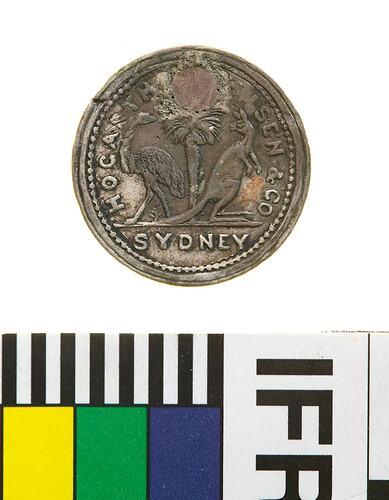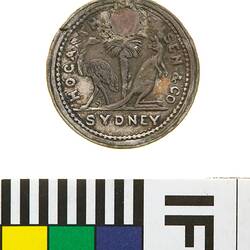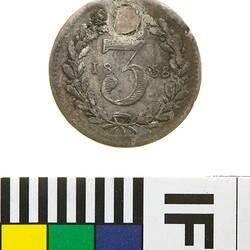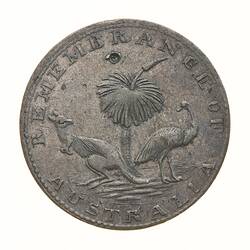Summary
Australia New South Wales Sydney
Hogarth, Erichsen & Co. Token Threepence 1858 (AD)
Mint: see References
Physical Description
A round silver token (16 mm dia) featuring the name and partial address of the issuer: Hogarth, Erichsen and Co., Sydney around a kangaroo at right and emu at left standing either side of a small grass-tree. The kangaroo and emu standing on straight exergue line with the word SYDNEY in a straight line below. The reverse features the denomination "3" , 7 mm tall, within an oak wreath and breaking the date, 18 58. This token is holed and plugged through the top of the grass-tree.
Obverse Description
Kangaroo to left and emu to right of a palm tree; around, HOGARTH [ERIC]HSEN & CO; in exergue, SYDNEY in straight line. (holed and plugged through ERIC of ERICHSEN)
Reverse Description
At centre within an oak wreath a large numeral 3, 7 mm tall, this divides the date 18 58
Edge Description
Plain
More Information
-
Collecting Areas
-
Acquisition Information
Transfer from National Gallery of Victoria (NGV), Dr Alfred A.W. Yelland, 15 Mar 1976
-
Date Issued
1858 AD
-
Issued By
Hogarth, Erichsen & Co., Sydney, Greater Sydney, New South Wales, Australia, 1858
-
Previous Collection
-
Inscriptions
Obverse: HOGARTH ERICHSEN & CO SYDNEY Reverse: 3 1858
-
Denomination
-
Series
-
Material
Silver
-
Axis
12
-
Classification
-
Category
-
Discipline
-
Type of item
-
Dimensions
16 mm (Outside Diameter), 1.272 g (Weight)
Holed and plugged
-
Shape
Round
-
References
Andrews 690 = Heyde 116/2 "Hogarth, Erichsen & Co. were jewellers in Sydney, and confined their energies to the issue of large numbers of threepences bearing their name. There were no less than eight varieties, often invery inferior metal. Indeed, so poor was the quality that it is said that they were withdrawn under Government pressure. Erichsen is credited with being the actual maker, and also with having the habit of striking a few whenever he felt in need of refreshment. Hogarth was also a practicle die-sinker, and for years after the firm was dissolved, worked largely for Stokes, in Melbourne, though never in his workshop." Andrews, Arthur Dr., Australasian Tokens and Coins, Mitchell Library, Sydney, 1921 p. 16. "The Hogarth, Erichsen pieces are of a later date, and generally of inferior metal. They were mostly struck at Leichardt in a press owned by Mr. Thornthwaite, who knew both Hogarth and Erichsen intimately... He (Hogarth0 may have prepared the die for this piece (the Aboriginal 4d And. 692) and possibly others, though Erichsen is generally credited with the making of the dies." Andrews, Arthur Dr., Australasian Tokens and Coins, Mitchell Library, Sydney, 1921 p. 112.
[Book] Andrews, Arthur. 1921. Australasian Tokens and Coins.
[Book] Heyde, Gilbert C. & Skinner, Dion H. 1967. Unofficial Coins of Colonial Australia and New Zealand.
-
Keywords



